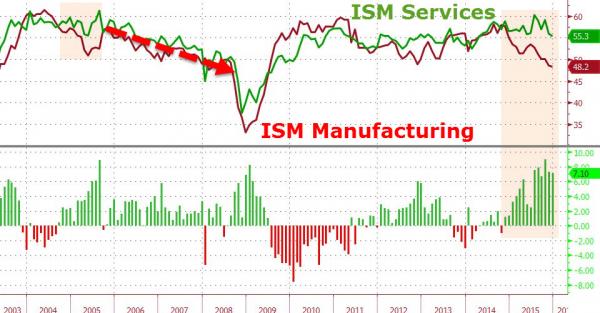Despite the services economy starting to turn down towards manufacturing’s inevitable recessionary prints, there remains a hope-strewn crowd of status-quo face-savers desperately clinging to the linear-thinking “but manufacturing is only 12% of economic output and thus is no longer a good bellwether for the overall economy” narrative. Here is why they are wrong not to worry…
On the left below, we see the mainstream media’s perspective on why a collapse in manufacturing“doesn’t matter” and you should buy moar stocks.
On the right below, we see why it does… especially since the “doesn’t matter” narrative is used only to justify buying moar stocks…

h/t @Spruce_gum
Which explains why this is happening!!

Self-destructing The Fed’s very own wealth-creation scheme.
While it is hoped that the economy can continue to expand on the back of the “service” sector alone,history suggests that “manufacturing” continues to play a much more important dynamic that it is given credit for.
The decline in imports, surging inventories, and weak durable goods all suggest the economy is weaker than headlines, or the financial markets, currently suggest. And in fact, services are starting to follow…

Of course, as we previously concluded, while recessions are “needed,” public opinion is generally quite simple in regard to recession: upswings are generally welcomed, recessions are to be avoided.The “Austrians” are however at odds with this general consensus — we regard recessions as healthy and necessary. Economic downturns only correct the aberrations and excesses of a boom. The benefits of recessions include:













Leave A Comment